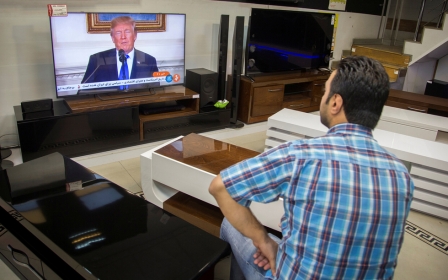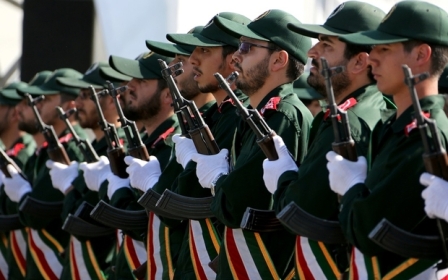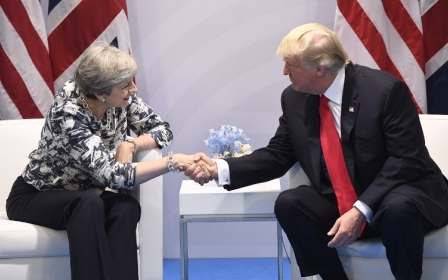Iran scrambles to contain Trump

On Wednesday, Iranian leader Ayatollah Ali Khamenei gave a combative response to Donald Trump's decertification of the Joint Comprehensive Plan of Action (JCPOA), the landmark nuclear accord. Deriding Trump for his "rants" and "whoppers," and refusing to address them directly, Khamenei nevertheless made clear that should the US tear up the nuclear deal, then Iran would "shred it to bits".
Addressing a group of "young elites" and "superior talents," Khamenei hinted at one important aspect of Iran's counter-strategy, namely creating a rift between the Europeans and the Americans. Appearing to praise the Europeans for defending the JCPOA in the face of Trump's onslaught, the Iranian leader, nevertheless, made clear that he expects Europe not to stake out an oppositional stance on Iran's ballistic missile programme as well as the Islamic Republic's regional policies.
This "divide and rule" strategy on the global stage is likely to be complemented by a bolder regional posture as Iran tries to stand its ground in the face of US pressure. Iran's more forceful posture in Iraq, including allegedly encouraging Baghdad to push back against Kurdish expansionism by retaking Kirkuk, is one clear indicator of this approach.
A sustainable partnership
As the pressure mounts on Iran in the months ahead, the Islamic Republic will mobilise all its conventional and unconventional resources to maintain and advance its position. Above all, Iran will prove its credentials as a uniquely "complex" state by alternating between revolutionary and status quo power in a bid to defeat the latest US plans.
Ayatollah Khamenei's remarks on Europe will be interpreted by the Iranian foreign policy establishment as encouragement to press ahead with plans to strengthen relations with the European Union.
All the indications are that relations are stable and continually improving. It is noteworthy that Federica Mogherini, the EU's high representative for foreign affairs and security policy, put up a spirited defence of the JCPOA on the same day Trump trashed the deal in Washington.
Furthermore, the visit by a high-level Iranian military delegation to a European naval conference comes on the heels of Mogherini's combative intervention. Iranian navy commander Rear Admiral Habibollah Sayyari’s trip to Venice to attend an anti-piracy symposium is the first time an Iranian military official of the highest rank has attended an EU-sponsored event in an official capacity.
By developing security cooperation with the EU, Iran seeks to soften the EU's position on non-nuclear related defence issues, notably Iran's ballistic missile programme. The JCPOA has nothing to say about Iran's missile programme, an issue Trump has raised repeatedly in a bid to tear up the deal; or failing that to - at least - impose significant modifications.
In keeping with its idiosyncratic strategic posture, Iran will be mixing global diplomacy with regional militancy in a bid to outmanoeuvre the United States
Even though, historically, the EU has been less than lukewarm about Iran's indigenous missile programme, and often raised concerns following Iranian missile tests, nevertheless Tehran will be hoping there is a sufficient gap in the EU and US positions to forestall a full Euro-Atlantic convergence on this issue.
Anglo-Iranian détente
It is important to point out that there is no perfect consensus on Europe in Iranian foreign policy circles. For example, former diplomat and veteran foreign policy doyen Hossein Sheikholeslam, who is close to hardliners, dissents from the emerging consensus by not acknowledging a significant gap between the EU and the US in relation to Iran's defence and regional policies.
More broadly, as part of its European diplomatic strategy, Iran will take heart from the United Kingdom's equally stalwart defence of the JCPOA. It is highly unusual for the UK to disagree with the US on an important global issue, an unprecedented divergence which Iran will likely fully exploit.
Since the advent of the JCPOA, Anglo-Iranian relations, which are historically extremely sensitive and notoriously volatile, have improved considerably with a UK green investment company reportedly signing a major 500 million euro deal to develop one of the world’s largest solar power farms in Iran.
By skilfully leveraging US vulnerability and capability gaps, and making it appear the US is abetting its goals, Iran reduces the risk of a confrontation
As part of this growing Anglo-Iranian détente, an important conference is scheduled for later this month at the prestigious London-based Royal United Services Institute thinktank to discuss Iran’s role in regional and global security. Needless to say such a conference would not be taking place had it not been approved by the UK intelligence community.
In keeping with its idiosyncratic strategic posture, Iran will be mixing global diplomacy with regional militancy in a bid to outmanoeuvre the United States. This is crucial to success inasmuch as the US is conflating the JCPOA with broader issues, notably Iran’s regional policy.
Therefore any retreat on the regional front will be interpreted as a sign that Iran is willing to renegotiate over JCPOA, either to modify the accord or failing that to negotiate an annex, as demanded by Trump, to address the accord's alleged shortcomings.
Regional reach
In tandem with continuous missile tests, Iran will likely showcase its regional reach with a view to exposing US impotence. An early sign of this approach is Iran’s behind-the-scenes manipulation of Iraq’s policy toward Kirkuk and other disputed areas. This has been largely achieved by inserting the Shia-led militias, formally known as the Popular Mobilisation Units, at the centre of the lightning offensive to wrest control of Kirkuk from the Kurds.
Iran's latest manoeuvre brings on-the-ground complexities, notably the fact that both Iran and the US have working relationships with multiple local partners, into sharp relief. By skilfully leveraging US vulnerability and capability gaps, and making it appear the US is abetting its goals, Iran reduces the risk of a confrontation.
In neighbouring Syria, Iran has drastically reduced US options by closer alignment with Russia and even regional rival Turkey. In view of these diplomatic complexities, and increasingly deft moves by Iran, it is very difficult to see how the Trump administration can translate its tough rhetoric into effective action.
In the final analysis, Iran's winning card against Trump is to constantly shift from revolutionary to status quo power in a bid to obfuscate, confuse and wrongfoot the adversary. It is a strategy borne out of the Islamic Republic's unique strategic profile as a "complex" state, or in the words of veteran US foreign policy strategist Henry Kissinger, an entity that defies conventional understanding.
- Mahan Abedin is an analyst of Iranian politics. He is the director of the research group Dysart Consulting.
The views expressed in this article belong to the author and do not necessarily reflect the editorial policy of Middle East Eye.
Photo: An Iranian student holds an anti-US President Donald Trump poster during a protest against Trump's latest speech on Iran, in Tehran, Iran 14 October 2017 (Tasnim News Agency/Reuters)
Middle East Eye propose une couverture et une analyse indépendantes et incomparables du Moyen-Orient, de l’Afrique du Nord et d’autres régions du monde. Pour en savoir plus sur la reprise de ce contenu et les frais qui s’appliquent, veuillez remplir ce formulaire [en anglais]. Pour en savoir plus sur MEE, cliquez ici [en anglais].






